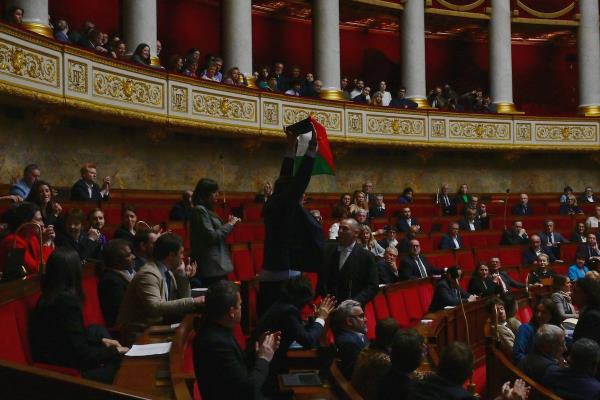The latest developments from the Israel-Hamas war.
A new exchange of Hamas hostages for Palestinian prisoners is planned for Sunday, the third day of the truce between Israel and the Islamist movement in power in Gaza, after two previous swaps.
As a sign of the fragility of the truce, Saturday's releases were delayed by several hours, with Hamas accusing Israel of not respecting the terms of the agreement concluded on Wednesday with the backing of Qatar and the support of the United States and Egypt.
The Israeli government said it had a list of those kidnapped who were to be released on Sunday, but did not reveal their identity, number or expected time.
Israeli forces operating in the occupied West Bank have killed at least eight Palestinians in a 24-hour period, Palestinian health officials said on Sunday, as a fragile pause in fighting between Israel and Hamas in the Gaza Strip entered its third day.
Violence in the West Bank has surged in the weeks since Hamas attacked Israel on 7 October.
Israeli forces have killed dozens of Palestinians and arrested hundreds in the West Bank. Jewish West Bank settlers have also stepped up attacks.
The Palestinian Health Ministry said that five Palestinians were killed in the militant stronghold of Jenin, while three others were killed in separate areas of the West Bank since Saturday morning - despite the truce. One of those killed, in al-Bireh in the central West Bank, was a teenager, the ministry said.
The Israeli military said forces entered the Jenin refugee camp to arrest a Palestinian suspected of killing an Israeli father and son at a West Bank car wash earlier in the year. In its statement on Sunday, the military made no mention of clashes, nor of the Palestinian deaths, but said forces were still operating in the area.
Hamas militants have released 17 hostages - including 13 Israelis - from captivity in the Gaza Strip, while Israel freed 39 Palestinian prisoners in the latest stage of a four-day cease-fire.
The late night exchange on Saturday was held up for several hours after Hamas accused Israel of violating their agreement. The delay underscored the fragility of the cease-fire, which has halted a war that has shocked and shaken Israel, caused widespread destruction across the Gaza Strip, and threatened to unleash wider fighting across the region.
The ceasefire, brokered by Qatar and the United States, is the first extended break in fighting since the war began. Overall, Hamas is to release at least 50 Israeli hostages, and Israel 150 Palestinian prisoners. All are women and minors.
Israel has said the truce can be extended by an extra day for every additional 10 hostages freed, but has vowed to quickly resume its offensive and complete its goals of returning all hostages and destroying Hamas’ military and governing capabilities.
The plight of the hostages has gripped the Israeli public's attention. Thousands of people gathered in central Tel Aviv on Saturday in solidarity with the hostages and their families. Many accuse Prime Minister Benjamin Netanyahu of not doing enough to bring the hostages home. The releases have triggered mixed emotions: happiness, coupled with angst over the scores of hostages who remain in captivity.
The office of Israeli Prime Minister Benjamin Netanyahu announced early on Sunday that it had received a new list of hostages slated to be released later in the day in the third of four scheduled swaps.
In the West Bank, hundreds of people burst into wild celebrations for a second night as a busload of Palestinian prisoners arrived early Sunday. Teenage boys released in the deal were carried on the shoulders of well-wishers in the main square of the town of Al Bireh. But the mood of celebration was dampened by scenes of destruction and suffering in Gaza.
The start of the pause brought quiet for 2.3 million Palestinians in Gaza, who are reeling from relentless Israeli bombardment that has killed thousands, driven three-quarters of the population from their homes and levelled residential areas. Rocket fire from Gaza militants into Israel also went silent.
The United Nations said the pause enabled it to scale up the delivery of food, water, and medicine to the largest volume since the resumption of aid convoys on Oct. 21. It was also able to deliver 129,000 litres (about 35,000 gallons) of fuel - just over 10% of the daily pre-war volume - as well as cooking gas, a first since the war began.




